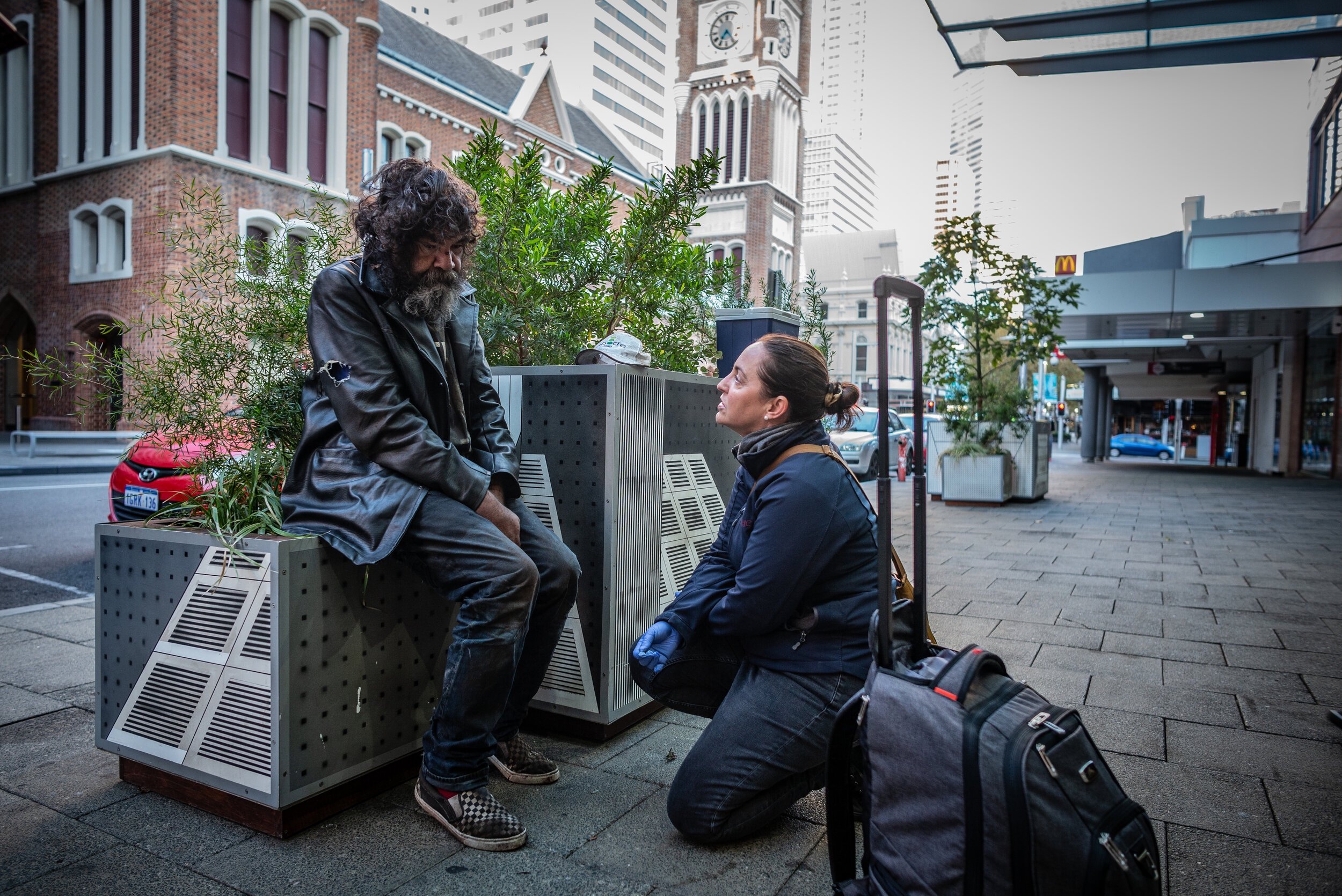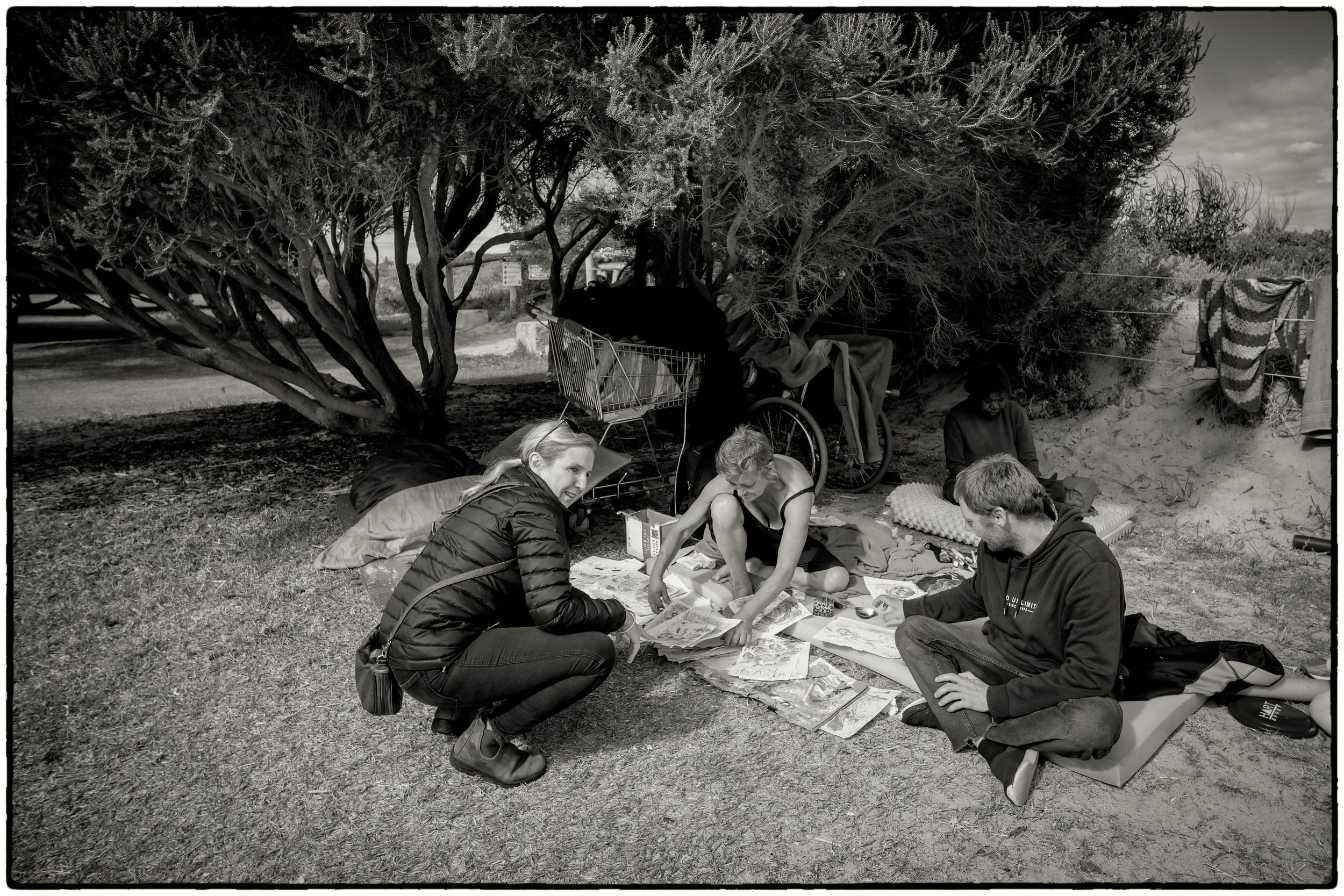
Street Health
Street Health: Bringing Compassionate Care to Perth’s Most Vulnerable.
Street Health is a specialised outreach service providing primary healthcare to people experiencing homelessness in Perth and Fremantle who are sleeping rough and not currently engaged with social or medical services. These individuals—often found in parks, public gardens, doorways, and pavements—are among the most marginalised and vulnerablemembers of our community.
Many people who are street-present have experienced severe trauma, which can make it difficult to access traditional healthcare. As a result, they often avoid or are unable to engage with mainstream services due to past negative experiences, stigma, or systemic barriers.

The Reality of Street-Present Homelessness.
People sleeping rough experience some of the poorest health outcomes in Western Australia, with an average life expectancy of just 45 years. The statistics highlight the urgent need for compassionate, accessible care:
On average, people experiencing street homelessness remain unhoused for five years, and the longer someone is homeless, the more their health deteriorates.
40% of people sleeping rough identify as Aboriginal or Torres Strait Islander, reflecting the deep impact of intergenerational trauma, systemic disadvantage, and the ongoing effects of colonisation.
Many have experienced repeated trauma, discrimination, and exclusion from healthcare, making it difficult to build trust with medical providers.
The Consequences of Limited Access to Healthcare.
Without regular access to healthcare, many treatable conditions go unmanaged until they become life-threatening. By the time someone presents to a hospital, they are often in urgent need of intensive, costly treatment.
At Royal Perth Hospital (RPH), many people experiencing homelessness seek care through the Emergency Department, often in moments of crisis. Without continuity of care, they are discharged back to the streets, only to return when their condition worsens.
A Trauma-Informed Approach: How Street Health Helps.
Since 2016, Homeless Healthcare (HHC) has been providing Street Health outreach in the Perth CBD, with nurses and caseworkers working together to meet people where they are and provide non-judgmental, person-centred care.
In 2018, after the closure of the Fremantle Emergency Department, HHC expanded the program to Fremantle, recognising the need for healthcare services tailored to the local community.
Street Health Teams & Community Partnerships
Perth Team: Works alongside UnitingWA’s Street to Home key workers, and collaborates with City of Perth Rangers and WA Police (WAPOL).
Fremantle Team: Includes HHC nurses and caseworkers, with strong connections to City of Fremantle Rangers and WAPOL.
Understanding the Complex Health Needs of People Sleeping Rough.
People experiencing long-term homelessness often face multiple, intersecting health challenges:
64% have a serious medical condition.
82% experience substance dependence, often as a way to cope with past trauma.
78% have at least one mental health or cognitive condition, such as PTSD, depression, or acquired brain injury.
47% experience all three conditions simultaneously.
Despite these high rates of illness, only about 25% access GP care, often because traditional healthcare services are not designed to meet their needs. Instead, many delay seeking help until their conditions become critical, leading to avoidable suffering and emergency hospitalisations.
Why Street Health Matters.
The Street Health program provides more than just medical care—it offers compassion, trust, and a pathway to stability. By meeting people where they are, without judgement or barriers, the service ensures that healthcare is accessible and safe, especially for those who have been let down by the system before.
With the right support, people experiencing homelessness can begin to heal, regain stability, and rebuild their lives—but consistent funding and ongoing commitment are essential to making this possible.
42% of street present homeless identified as Aboriginal or Torres Strait Islander, well above the population average of 3.1% in WA.

The street present population is notoriously difficult to engage because of their high levels of traumatic life experience and previous negative experiences with health service.
The Support Street Health provides.
Finding & building rapport with people not engaged in homeless services
This has included people who:
Have had past distressing experiences in health system
Are new to homelessness (including since COVID-19)
Are reluctant to engage with homelessness or other health services
Struggle to communicate their needs (e.g. due to trauma, psychosis, brain injury)
Mental Health and AOD support
Gently building trust and unobtrusively assessing mental health &/or AOD issues
Informal counselling for people experiencing situation crisis and anxiety
Referrals to mental health/AOD services, and follow up to help people navigate this
Mental health treatment (e.g. monthly depot injections for psychosis)
On the spot primary care
Wound assessment and dressings
Diagnosis &/or treatment for asthma & respiratory conditions, infections, diabetes, Flu and now COVID vaccinations
Checking with people how they are managing with existing conditions (e.g. epilepsy, emphysema, high blood pressure)
Antenatal /pregnancy care
Strengthening continuity of connections to other services
Input to case management for complex needs clients of health or homelessness services
Linking people to relevant services and supporting this with follow up (e.g. WANDAS, Derbarl Yerrigan, alcohol and drug or mental health services)
Locating people that other health services are concerned about (e.g. people who have self-discharged from RPH)
Arranging GP follow-up via Homeless Healthcare clinics
Impact.
During the first 18 months of operation, Street Health was able to engage the majority of the street present population in the Perth CBD. The high levels of acceptance within the group facilitates engagement with the more reclusive individuals. In the 12 months 2015-2016, Street Health has carried out 929 consultations in 427 rough sleeping individuals. During the 2017/2018 period, 18% of Street Health patients decreased their number of hospital days and 62% showed no change in their number of hospital days, indicating that they did not become sicker and spend more of their time in hospital, despite the health risks associated with sleeping rough.
The presence of an Assertive Outreach worker on Street Health rounds brings expertise in community services for rehousing and support to public places to start the process of engaging rough sleepers in coming off the street and into accommodation to address the social determinants of health. The coupling of health and community services means that Street Health is able to make a real impact on the lives of rough sleepers, recognising that both issues need to be addressed simultaneously. Thanks to Street Health, many homeless people who are street present are now regularly attending general practice and are being rehoused and supported by programs such as Street to Home and the 50 Lives 50 Homes collaboration.

